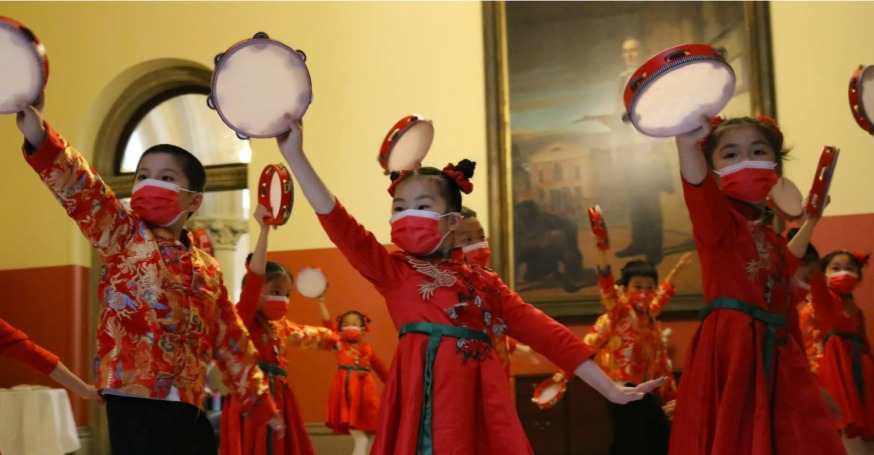
New York City students perform songs and dances representing various Asian cultures at Tweed Courthouse, the New York City education department headquarters, as part of launching a new curriculum focused on Asian American and Pacific Islander cultures.Christina Veiga / Chalkbeat
 This article was originally published by Chalkbeat New York on May 24
This article was originally published by Chalkbeat New York on May 24
BY
New York City is piloting a curriculum on Asian American history this fall, with a wider rollout planned for 2024, officials announced Thursday.
The lessons are part of the city’s roughly $200 million investment in Universal Mosaic, a curriculum under development that aims to provide more culturally representative lessons for the nearly 1 million students in the nation’s largest school system.
Called “Hidden Voices: Asian American and Pacific Islanders in the United States,” the guides will be available to every grade level and will include profiles of influential members of the community, often referred to as AAPI. The education department will provide training for teachers on the lessons and will buy books that reflect the AAPI experience.
At a press conference at Tweed Courthouse, the education department’s Manhattan headquarters, Chancellor David Banks said the curriculum “honors all that our Asian American and Pacific Islander students and families contribute daily to our school communities and city.”
“We want each child to be heard and seen for who they are, to feel deep in their bones that they are respected and important,” Banks said.
Many advocates have been calling for schools to incorporate more lessons that better reflect the diversity of the city’s students. That includes Asian Americans, who make up the fastest growing racial group in New York City. Mayor Eric Adams said with the creation of the new curriculum, “we are listening to the people.”
There are also efforts at the state level to introduce more students to the contributions of the Asian community. State Sen. John Liu has proposed legislation to require Asian American studies in schools. The bill is in committee. Advocates are calling for $800,000 to be devoted to the statewide curriculum from a pot of $20 million that has already been approved for AAPI causes.
“When I immigrated here at the age of five, I thought I was going to be American. It wasn’t long thereafter that I found that in the schools, as well as in the streets, that I was somehow different,” Liu said. “In order for us to overcome this difference that has been imposed on us, we need to teach our experience.”
Calls for more representative lessons have only grown louder amid a wave of anti-Asian violence. Attacks have swelled since the coronavirus pandemic hit in March 2020, including the 2021 spa shootings in Atlanta that left dead six women of Asian descent — though many at the press conference noted that discrimination against Asian Americans has long been intertwined with the country’s history.
In New York City, students say it has taken a toll, recounting experiences of being afraid for their safety and subjected to racist comments.
“Growing up, I didn’t see many people like me in the history books or in media. So for a while, I thought that maybe there was just nobody notable, but that couldn’t be further from the truth,” said Mikayla Lin, a student at Stuyvesant High School who spoke at the press conference about her own family tree. “We don’t want to be segregated and separated out with the title of ‘model minority.’ And we are not any less American than anybody else.”
The advocacy group Coalition for Asian American Children and Families (CACF) has been working on its own pilot curriculum to use with youth organizations across the city. It centers on healing by allowing young people to explore their own backgrounds and building community across identities, said Kristen Sze-Tu, a program coordinator at CACF who helped create the lessons.
“We have to have a complete understanding of where we’re coming from before we know where we’re heading to,” said Ivy Li, the associate director of mental health at Apex for Youth, a nonprofit that works with the AAPI community.
CACF is among the organizations involved in creating New York City’s new curriculum along with the Asian American Education Project, the New York Historical Society, Columbia University, Hunter College, and the Yuri Education Project.
Christina Veiga is a reporter covering New York City schools. Contact Christina at cveiga@chalkbeat.org.
